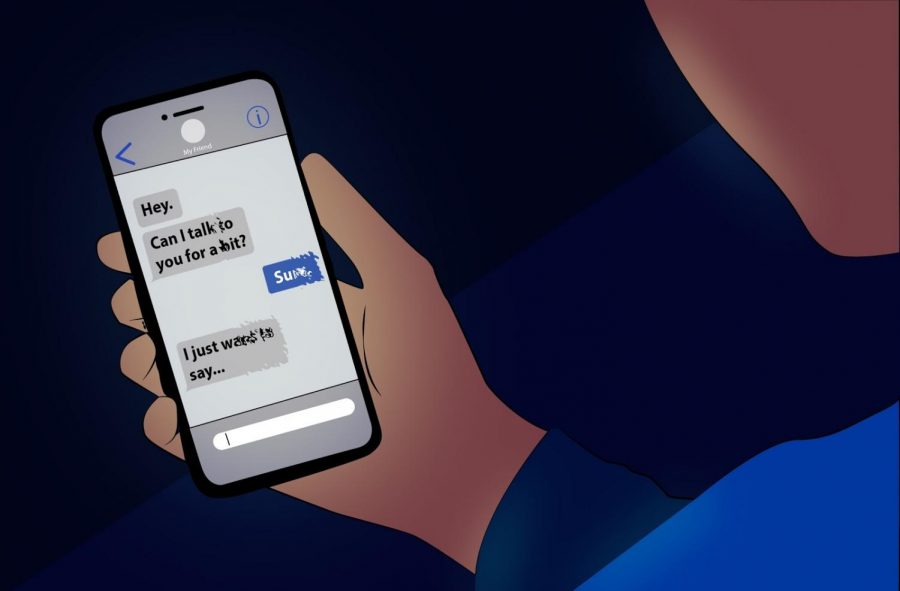Words: Declining in power, increasing in importance
As digital communication grows, the significance of words is decreasing and people are developing a more limited vocabulary. The Sidekick staff writer Avani Kashyap discusses how we need to stop normalizing words. Graphic by Shriya Vanparia.
January 28, 2020
Walking into Coppell Middle School West for the first time, I was utterly shocked to hear a barrage of curse words as I went down the hall. Three years later, walking into high school for the first time, I was greeted by the same, if not more intensified situation.
But this time, my reaction was nonexistent. It took me a long time to ask myself why.
In a world where an estimated 93% of communication is nonverbal, our body language and tone often convey more than actual words themselves. However, with the rise of digital communication, which has minimal nonverbal influence, our interpretation of language is becoming more influenced by verbal communication, undoubtedly increasing the importance of words.
Unfortunately, while words seem to be increasing in importance, they also seem to be losing their significance. Once-powerful words have somehow been integrated into everyday language, ultimately losing their power.
To retired Coppell citizen Randy Kemberling, who has read multiple dictionaries to increase his vocabulary, words are objects of fascination that reveal new things about the world.
“The degradation of language has such a spiritually, emotionally, politically and economically broad impact on every aspect of everybody’s lives,” Kemberling said. “Once you have command of words, that’s something no one can ever take from you because words have power and they are probably one of the most important things you can have in your life.”
Evolution of language is inevitable. Over time, words and phrases are bound to change their meanings and adopt new significance. However, the degradation of language is not.
As the acclaimed philosopher Confucius said, “When words lose their meaning, people lose their freedom.”
Today, impactful words are being normalized and vocabulary is decreasing to the point where our range of verbal expression is becoming more and more limited. These trends inhibit our thoughts and increase our risk of miscommunication, leading to a need to choose our words wisely.
“We are very loose with our words, I’m worried we’re a little desensitized with what we say and don’t think before we speak,” Coppell High School Principal Laura Springer said. “Our words define who we are, and there’s a big importance of pausing if you’re angry before you respond to anybody because immediately, that passion might allow us to say hateful and hurtful things.”
On the subject of hateful and hurtful things, my experience with cursing is what helped me realize how much words can lose their meaning. When I heard curse words being used in sixth grade, I was extremely shocked by how commonly they were used. While I had grown up thinking those words were strictly taboo, I soon realized cursing was very common. A few years later, I was so desensitized to cuss words that their usage had no impact on me.
A few decades ago, cursing was reserved for extreme situations and was used very sparingly. Fast forward to today, and cursing has become normalized to the point where it has become a part of mainstream culture. Not just cursing, but even words like genius, ecstatic and devastated have been so commonly used, they have lost their original significance.
The problem lies in the fact that there are no replacements for these words. There are no new powerful words that we can use to express our extreme emotions or even simply convey our subtle beliefs.
In the world of digital communication, a lack of powerful words creates an inability to express a wide range of thoughts and increases the risk of miscommunication. Words that are used to express extreme sadness might be interpreted as mild distress, while simple annoyance might be interpreted as rage.
“Our words show how we feel and they can tell something about the inside of you that others can’t see from the surface,” CHS librarian Trisha Goins said. “Once you speak words, they’re out there, and it’s really hard to take them back, so it’s important to choose your words wisely in order to accurately communicate whatever it is you are talking about.”
Being conscientious with your language has effects that extend beyond verbal expression. It conveys genuine engagement and reflects a person’s personality.
“I wish people would realize every word that comes out of your mouth leads to one of two things,” Springer said. “You are going to make a difference in a person’s life. The difference is going to be whether you lift them up or put them down, and your words will be the difference in that.”
Choosing my words wisely helps me accurately express my feelings and understand my emotions. When I feel upset and have the urge to curse, I am able to remind myself that to me, those words are reserved for the absolute worst, and my current situation, while not great is still not terrible. This is the power that words have for me. But the relationship is unique to each and every person, and we should have the chance to discover it before it’s too late.
Follow Avani @AvaniKashyap03 and @CHSCampusNews on Twitter.













Mr. Orlopp • Feb 1, 2020 at 1:17 pm
A wonderful exploration of the importance of language, Avani. Great use of quotes from two great thinkers (Confucius and Springer) and I especially liked your thoughts on being desensitized to cursing. Expand your lexicon people!
B. Smith • Jan 31, 2020 at 4:33 pm
Strong words from such a young voice.
I hope this young lady, Avani, doesn’t get lost in the ocean of poo that passes as creative writing, these days.
Good J ob, Avani!
Keep writing, you will go far.
Anthony Cesario • Jan 28, 2020 at 9:25 am
I love this column Avani! I feel like it’s something we don’t consider all that often but it’s very important that we recognize the importance and impact of words.